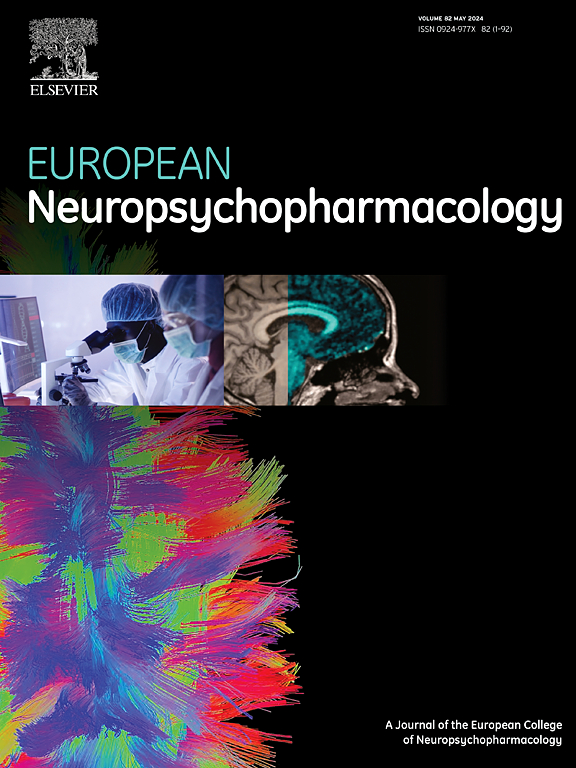通过整合基因组和生命历程数据,增进对精神障碍的了解
IF 6.1
2区 医学
Q1 CLINICAL NEUROLOGY
引用次数: 0
摘要
抑郁症等精神疾病的基因组基础研究取得了重大进展,确定了数百个关键基因组位点,加深了对致病途径的了解,并改进了药物靶点的方向。然而,尽管取得了这些进展,我们对这些精神障碍的遗传机制的实际了解仍然有限,因此我们开发更好的治疗方法的能力也很有限。造成这种情况的一个原因是,研究往往侧重于终生或横断面效应,但精神障碍并不是一成不变的,它们会随着时间的推移而发生变化,而且可能在某些时期遗传效应更为突出。同样,生命历程研究方法认为,同一人在一段时间内重复获得的信息很可能具有高度相关性,利用这种相关性可以减少测量误差并改善信号。随着大规模纵向生物库的出现、基因数据的可用性和新的统计方法的出现,生命过程和基因组(全基因组关联研究、多基因风险评分、泯灭随机化)方法的结合正变得越来越普遍。在本次研讨会上,我们将重点介绍该领域的新工作,这些工作展示了将基因组学和生命过程方法相结合以提高对精神障碍的认识的实用性。首先,Alex Kwong(爱丁堡)将展示,利用英国生物库等大型数据集对抑郁症进行重复评估可提高全基因组分析的信号,从而获得更多的全基因组重大命中、更多的映射基因、更高的基于单核苷酸多态性(SNP)的遗传率以及在PRS分析中更高的解释变异量。接下来,Poppy Grimes(爱丁堡)将介绍 PGC-MDD 和 EAGLE 联合体利用前瞻性和回顾性队列的重复数据进行青少年发病抑郁症 GWAS 研究的最新结果。这些结果表明,前瞻性队列和回顾性队列之间存在良好的遗传相关性,但重要的是,它们还发现了新的 GWAS 热点,其中一些热点在成人 MDD 中是常见或独特的。随后,Robyn Wootton(奥斯陆)将展示如何在纵向研究中实施 MR,以检查预测因子对抑郁症发展的特定时期的因果效应,而不仅仅是对终生效应的平均值。最后,Ruby Tsang(布里斯托尔)将展示在 ALSPAC 研究的 30 年数据中,一系列精神疾病遗传风险是如何与更严重的抑郁轨迹相关联的。米歇尔-尼瓦德(Michel Nivard)(布里斯托尔)将对这些研究进行总结,并讨论未来的纵向研究和遗传研究应如何确保这一研究领域取得丰硕成果。本文章由计算机程序翻译,如有差异,请以英文原文为准。
ENHANCING UNDERSTANDING OF MENTAL DISORDERS THROUGH INTEGRATION OF GENOMIC AND LIFE-COURSE DATA
There has been substantial progress into the genomic underpinnings of mental disorders, such as depression, which have led to the identification of hundreds of key genomic loci, enhanced understanding of causal pathways and improved direction for drug targets. However, despite such progress, our actual understanding of the genetic mechanisms underlying these mental disorders, and therefore our ability to develop better treatments is still limited.
One reason for this research has tended to focus on lifetime or cross-sectional effects, but mental disorders are not static, they change over time and may have periods where genetic effects are more prominent. Similarly, life-course approaches postulate that repeated information from the same person over time are likely to be highly correlated and leveraging that correlation can reduce measurement error and improve signal. Combing life-course and genomic (genome-wide association studies [GWAS], polygenic risk scores [PRS], mendelian randomization [MR]) approaches are becoming more common with the emergence of large-scale longitudinal biobanks, availability of genetic data and new statistical methods. This integration of both these approaches could lead to an enhanced understanding of the genomics of mental disorder more broadly, but also how genetics influence the onset, course and persistence of mental disorders across the life-course.
In this symposium, we will highlight emerging work from this field that demonstrates the utility of combining genomic and life-course methods for improved understanding of mental disorders.
First, Alex Kwong (Edinburgh) will show that leveraging repeated assessments of depression from large datasets such as UK Biobank improve the signal in GWAS, resulting in a greater number of genome-wide significant hits, more mapped genes, higher single nucleotide polymorphism (SNP) based heritability and higher amount of variance explained in PRS analysis. Importantly, this approach identifies greater GWAS signal in non-European ancestries, providing a framework for potentially improving gene discovery in future studies.
Next, Poppy Grimes (Edinburgh) will present the latest PGC-MDD and EAGLE consortia results from an adolescent onset depression GWAS using repeated data from prospective and retrospective cohorts. These results show good genetic correlation between prospective and retrospective cohorts, but importantly also identifies novel GWAS hits, some of which are common or unique to adult MDD.
Following, Robyn Wootton (Oslo) will demonstrate how MR can be implemented within longitudinal studies to examine the causal effect of predictors on specific periods of depression development, rather than just on averaged lifetime effects. Using data spanning over 30 years from the ALSPAC study, these results show how predictors such as BMI and educational attainment may be causal of later depression development.
Finally, Ruby Tsang (Bristol) will show how a spectrum of psychiatric genetic risk are associated with more severe depression trajectories, across 30 years of data in the ALSPAC study. Importantly, these results highlight that genetic risk of psychiatric illnesses are not uniform, some are more important that others and have much greater effects across various stages of the life-course.
Michel Nivard (Bristol) will summarise these studies and provide a discussion on what future longitudinal and genetic studies should do to ensure this becomes a fruitful area of research.
求助全文
通过发布文献求助,成功后即可免费获取论文全文。
去求助
来源期刊

European Neuropsychopharmacology
医学-精神病学
CiteScore
10.30
自引率
5.40%
发文量
730
审稿时长
41 days
期刊介绍:
European Neuropsychopharmacology is the official publication of the European College of Neuropsychopharmacology (ECNP). In accordance with the mission of the College, the journal focuses on clinical and basic science contributions that advance our understanding of brain function and human behaviour and enable translation into improved treatments and enhanced public health impact in psychiatry. Recent years have been characterized by exciting advances in basic knowledge and available experimental techniques in neuroscience and genomics. However, clinical translation of these findings has not been as rapid. The journal aims to narrow this gap by promoting findings that are expected to have a major impact on both our understanding of the biological bases of mental disorders and the development and improvement of treatments, ideally paving the way for prevention and recovery.
 求助内容:
求助内容: 应助结果提醒方式:
应助结果提醒方式:


